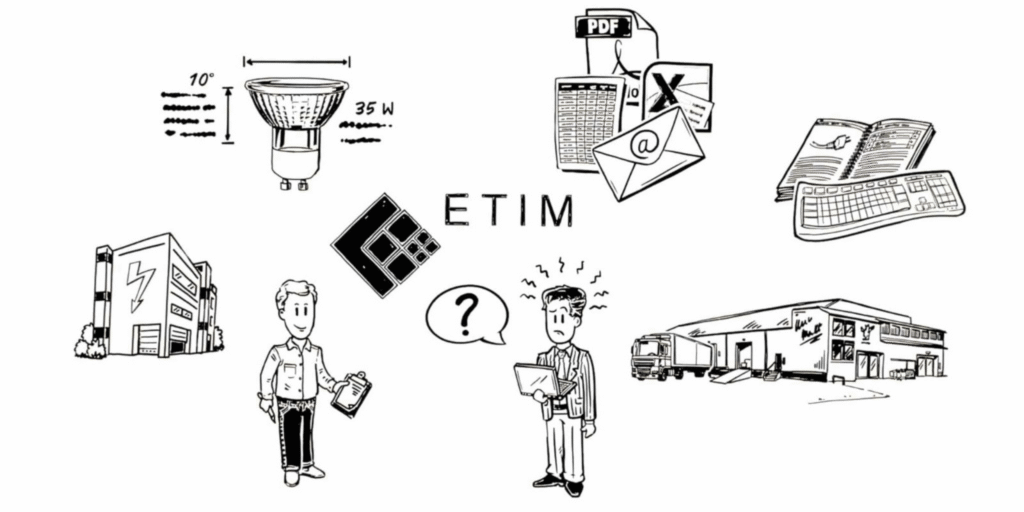Managing product data for technical products can be a complex challenge, especially when you are dealing with thousands of different items, each with their own specifications. Fortunately, there is an international standard that simplifies this challenge considerably: ETIM. In this blog, we explain exactly what ETIM means, how it relates to 2BA, and why this combination can be a game-changer for your webshop.
What is ETIM?
ETIM is an international product classification standard that focuses on technical products, particularly for The construction, installation and electrical engineering sectors.
This standard is followed internationally by manufacturers, suppliers and users of technical products. Because everyone in the chain uses the same classification, it creates uniformity in product information and ensures data quality.
The ETIM model works according to a two-layer structure: product groups and product classes. Each product class contains a specific set of technical characteristics defined by ETIM International. These classifications with associated characteristics can be can be found here in the ETIM Viewer.
A key advantage of ETIM is that it is multilingual, media-neutral and vendor-independent. This allows companies worldwide to exchange product information in a consistent manner.

The relationship between ETIM and 2BA
ETIM and 2BA are often mentioned together, but what exactly is the relationship between the two?
2BA is a Dutch organisation that has managed a central product database for the technical sector since 2004. This database is built entirely according to the ETIM classification and is fed by manufacturers, importers and wholesalers.
The numbers are impressive: the 2BA database contains more than 4 million product data and almost 24 million trade data. By using the ETIM standard, everyone in the chain knows exactly what is meant by each product specification.
For users, this means that they can search for products from different suppliers in one database, with all information presented in a standardised way. For example, installers can easily see which wholesaler a specific product is available from.
So the obvious thing to do is to use 2BA's database if you work in the tech sector.
Why you want to apply this in your webshop
If you sell products for the construction, installation or electrical engineering sectors, implementing ETIM classification in combination with 2BA can bring significant benefits:
Automation of product enrichment: By integrating with 2BA, you no longer need to enrich products manually in your ecommerce system or PIM. All technical specifications, supplied by the manufacturer, are automatically made available.
Improved search functionality: You can then use the standardised specifications for your search engine and filters, allowing customers to find the right products much faster.
Increased findability: By sharing your catalogue with 2BA, installers know that your products are available from you. This increases your reach within the professional market.
Consistent data quality: Because product information is managed to a fixed standard, the quality and completeness of your product data is guaranteed.
Implementation in your webshop: a step-by-step approach
1. Develop a data plan
Before you start implementing, it is essential to develop a solid data plan. Ask yourself questions like: How do I handle large volumes of product data? How do I classify it in my webshop? Within systems like Akeneo and Magento, for example, you can link families and attribute sets to ETIM product classifications.
2. Application to 2BA
The next step is to register with 2BA. Costs vary depending on your specific needs, so it is advisable to contact 2BA directly for a tailor-made quote.
3. Setting up integration
After accessing the 2BA database, you can integrate in several ways:
- Download of files
- Via the Unifeed
- Via web services (our preference)
We recommend integration via web services, linked to your PIM system. This allows you to read real-time data from the 2BA database and keeps your product information always up to date. For example, from Ecomwise we can link Akeneo PIM to the 2BA database, after which Akeneo will be linked to your Magento or Shopware webshop.
There are also PIM systems that already offer out-of-the-box integration with 2BA, including Compano and Proplanet. This can significantly speed up implementation.
Summary
Together, ETIM and 2BA form a powerful combination for companies in the technical sector. By implementing these standards, you not only automate your product data management, but also increase the quality of your product information and the findability of your products.
The investment in time and cost is more than compensated by the efficiency gains and improved customer experience this implementation brings. For companies serious about their position in the tech market, this is no longer a choice but a necessity.
If you need help linking 2ba to your Magento or Shopware shop, or your PIM system, please contact us without obligation.






